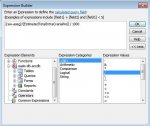GrievousAngel
New member
- Local time
- Yesterday, 20:31
- Joined
- Sep 21, 2009
- Messages
- 7
hello all,
i bet this has been asked b4 >
how can i perform basic math on Access db columns? i need to multiply a constant by the present column value ($).
the kicker is also only doing partial rows, i.e. some rows X .96, some rows x .99, etc.
if you could hi-lite rows/columns, then do math would be the ticket!
BTW: how on earth could MS build access without this basic function? they want you to buy Excel and import/export!
thanks,
billy
i bet this has been asked b4 >
how can i perform basic math on Access db columns? i need to multiply a constant by the present column value ($).
the kicker is also only doing partial rows, i.e. some rows X .96, some rows x .99, etc.
if you could hi-lite rows/columns, then do math would be the ticket!
BTW: how on earth could MS build access without this basic function? they want you to buy Excel and import/export!
thanks,
billy



